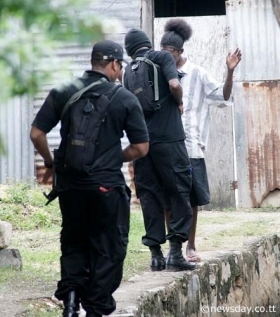More than 70 days after Trinidad and Tobago declared a “state of emergency” due to crime concerns, the prime minister has revoked an unpopular nighttime curfew. But the more dramatic emergency measures will remain in place, raising questions about the government’s long-term strategy against crime.
Trinidad and Tobago approved the state of emergency in late August, granting police special powers to make arrests without charges and conduct searches without warrants. In parts of Trinidad deemed crime hotspots, civilians had to obey a curfew between 11 p.m. and 4 a.m. or risk being arrested and fined.
The government announced on November 7 that the curfew is now abolished. This is one sign authorities decided to take complaints from the tourism and nightlife industry into account. If tourism, rather than the oil and gas industry, accounted for the biggest sector in the island’s economy, it is doubtful the government would have been as willing to extend the night curfew for so long.
According to government figures, the crime crackdown saw the arrests of over 6,000 people, the majority held for breaking curfew hours. With just 35 murders registered between August and November, homicide rates dropped 60 percent compared to the same period last year. Other crimes like house robberies and car jackings also saw reductions.
Prime Minister Kamla Persad-Bissessar added that during the state of emergency period, the government seized more marijuana and ammunition than in all of 2010.
If the aim behind the move was to increase drug seizures and prompt a temporary cessation in criminal activity, these statistics certainly prove that took place. If the other goal was to prevent a suspected battle between a Colombian and Trinidadian gang, as one government spokesman claimed, this was also apparently achieved.
But the government’s decison to extend police special powers for an unstated amount of time raises questions about what are the ultimate long-term goals of the state of emergency, or if there even are any. In September, Congress voted to extend the declaration for an additional three months, meaning police should lose the power to conduct warrantless searches in December. Persad-Bissessar did not say if this timetable still holds.
The costs of giving police such broad powers to carry out searches and arrests arguably outweigh the short-term benefits. Making it easier for police to round up suspects has not broken the back of the island’s street gangs, but instead prompted widespread accusations of police misconduct. During the emergency period, many of those arrested for gang-related activity were later released due to lack of evidence. By making large-scale arrests a key component of the state of emergency, the government risks further alienating people from the police and filling the prison system with youths who then deepen their involvement in criminal activity.
The current crime wave is a phenomenon building up over the past decade. Trinidad and Tobago has seen rising homicide rates since 2001, when a then-record 151 murders were recorded. Most involve street gangs whose main income stems from robberies and local drug dealing. For such a long-gestating problem, it’s unclear how the state of emergency will provide anything except short-term relief.

